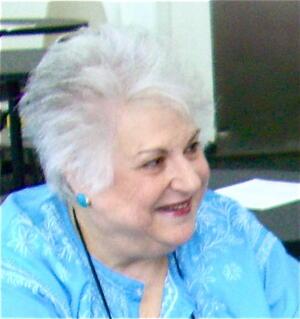"Sipping from the Nile": A memoir of the Exodus of Cairo's Jewish daughters
I was raised in a beautiful mansion on the banks of the Nile, in a multi-cultural multi-lingual Sephardic Italian Jewish family in Egypt: a Middle Eastern family, where men rose to prominence by their acts in a larger world, while women ran households, managed a large staff, volunteered their services to Jewish charities, and gained their reputations from their family backgrounds, skills at needlework and music, as cooks, and hostesses, and their elegance at all times.
My father was a mild man. He was gregarious and funny, a lover of literature and music that fate had pushed into finance. He left much of the parenting to my mother, whose fiery red hair was matched by an engaged and passionate nature.
When I was five, my father beamed proudly alongside my jubilant mother when I brought home excellent weekly placements from school. Then, something happened. From landing first or second place, week after week, I announced without embarrassment that I was fifth, then twelfth, then fifteenth, then twentieth in my class of twenty.
“What did you say?” my mother asked in disbelief, but I was too comfortable with life to obfuscate and when my father asked the same question, I giggled happily and said “I was twentieth this week.” He looked at me gravely for a long time. Then he said “come here.” He sat on his side of their bed, pulled out his slipper from the nightstand, laid me across his knee and walloped me a couple of times. It didn't hurt at all, physically, but my dignity was totally outraged and I wailed as he put the slipper away. He glared at me. “Never do that again,” he said. “You always have to do your best.”
My father never raised his hand to me again. Never. He didn't need to. I got his message loud and clear and never again brought home anything less than my best. My father never let me believe that because I was a girl, anything less than the best would be tolerated, and if I found things hard to master, he was always there to comfort and encourage, always convinced I would be able to handle whatever life handed me.
Nonetheless, a hue and cry arose when I was to graduate from the all-girl British boarding school I attended and expressed a wish to go to Cambridge University. My intellect and its pursuits were viewed with pride, but the idea that they would lead me to sleep away from home in an unsupervised milieu where men also roamed, was outside possibility.
I loved my parents. Observing their distress, I pushed and argued for a while and then made my peace with attending a BA University course at the British Council in Cairo. I never wondered what I would do with that BA once I had earned it. I only knew that I needed more than waiting for marriage, the daily round of dress fittings, tennis matches, staid visits with friends, and the rich international cultural banquet of music, opera, and ballet that post-colonial Cairo still offered.
Before attending my first lecture at the British Council, the Suez canal crisis of 1956 erupted and put an end to that life. The men and women of the deeply rooted Jewish communities of Egypt, dispossessed of their homes and financial security, suddenly strangers in their own lives, were catapulted into unfamiliar situations where struggle was their daily fare. Some sank, many swam.
I watched many of those carefully nurtured Jewish girls hurled into lives of deprivation and challenge from one day to the next, navigating the change in their circumstances with formidable grace.
To name a few, R. rose to prominence in Paris as an educator, heading the International School, recognized as an international expert in early childhood education. P. became a recognized artist whose works were displayed in Britain's National Gallery. H. became a world-renowned fan expert, founding the Fan Museum in Greenwich, UK, on the recommended list of tourist sights in and around London; V. flourished as an economist and college professor, C. wrote internationally famous cookbooks; A. opened a prized Manhattan restaurant; M. became a top interpreter at the UN; J. founded a New York literary agency; some are art dealers in Paris and New York, some conquered the world of finance.
To many, it has seemed a mystery, how nimbly we, pampered Jewish daughters of a vanished world, spread our untried wings and flew. Deprived of the outward trappings of ease and status, we mined ourselves for the tools we needed. We searched for ways to adapt to new worlds and new expectations, and in the process, discovered our potential and fulfilled ourselves.
And I thank my father for his words. They still resonate, all these years later, long after his death, even now that I am a grandmother with children and grandchildren of my own, still doing my best in a faraway land.
About Jean Naggar:
Jean Naggar was born in Alexandria, Egypt. She grew up in Cairo, moving to England, and then New York City, where she currently resides. She is the founder of the prominent Jean V. Naggar Literary Agency, Inc. Her work has been published in the New York Times, the Village Voice and Publishers Weekly. She is the mother of three adult children and grandmother of seven. Now, she is at last exploring her childhood dreams: to write.
Her memoir of a magical childhood, SIPPING FROM THE NILE, My Exodus from Egypt, is available in print, Kindle and audio versions at the following link: Amazon, or you can visit her at: www.jeannaggar.com and www.JVNLA.com.









Thank you for this wonderful nostalgic piece. I never new the lavish life Egypt offered before 1956 where sectarianism did not exist and when friendships thrived regardless of religious backgrounds. The tone of your writing echoed my own family background and made my childhood alive again.
I so enjoy your writings. Many times I am encouraged and motivated, always I am entertained. Thank you.
I agree with all of the comment and praise from Ellen Schecter, and want to add that I found the book to be magical for me--an immersion in a way of life so exotic and unexpected (for me). This is not to trivialize or do anything negative about it--but it was as luxurious a trip for me as, say, Downton Abbey in that it's a well-told visit into another era, another culture, another wealthy, powerful, glamorous and gracious society. This is one "Jewess" (who would never identify herself that way) who thought she knew Jewish history, but only knew about the Shtetls of Russia and the assimilated German Jews, and thought that even the dispersed Sephardim probably had come to fit into one or the other of those categories. That made this thoroughly enjoyable memoir also a learning experience. A terrific book.
Sipping from the Nile is a rich and glorious book. Naggar brings to life a lost world, with all of its sights, fragrances, and customs. Her family is rambunctious, full of fun, elegant and powerful, connected to the rich and powerful not only in Egypt but across the world. She brings them to life with an excellent ear for detail, translating a hodgepodge of languages into a narrative full of interesting and sometimes nerve-wracking incidents. Read this book for its picture of a wonderful extended family as well as its revelations of a world that no longer exists: you will never forget it.